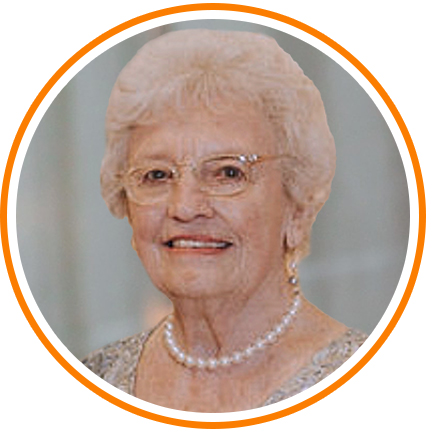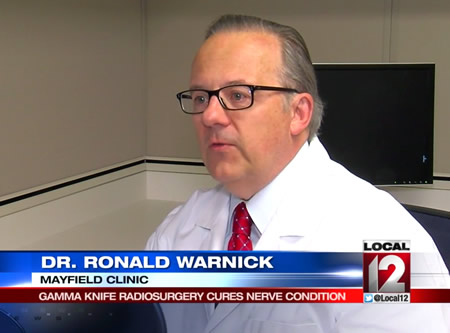
Shirley's story
The ageless beauty of Gamma Knife®
Shirley may have passed her 90th birthday, but she has no intention of slowing down. She's a retired businesswoman, a mother of 7, grandmother of 19, great grandmother of 18, and great-great grandmother of 1. She lives in a retirement community, joins in all the activities, and can count the number of days on her hand when she hasn't had someplace to go.
A few years back, after falling on the ice, Shirley was taken to the emergency room and informed that she was having a heart attack. She looked the emergency medical technician square in the eye and replied, "Let me tell you something. I am not having a heart attack."
Despite her protest, a stent was placed, and Shirley notes that her EKGs have been stellar ever since.
Several months after the fall, however, a new health concern surfaced. "It started when I would just touch my nose," Shirley says. "I'd draw back because it was painful. I went to the doctor thinking I had a sinus infection, but he said no. He diagnosed it right away as trigeminal neuralgia."
A series of interventions began for this painful condition of the trigeminal nerve, a cranial nerve that arises from the brainstem and divides into branches that provide feeling over the face.
Shirley's primary care doctor referred her to a neurologist, who prescribed Tegretol (carbamazepine), which is commonly used as a first line of treatment for trigeminal neuralgia. The medication curbed Shirley's pain, but she broke out in a full-body rash. The neurologist then prescribed gabapentin, an anticonvulsant often used to treat neuropathic pain. The medication worked, but as time went on Shirley needed a progressively higher dose. A steroid injection in her cheek temporarily blocked her pain, but a second injection did nothing. Her pain "over 10" on the pain scale (1 to 10), Shirley gradually reached the maximum gabapentin dosage of 2,700 milligrams a day.
"One time the pain was so bad the side of my face was throbbing for two days," Shirley says. "I thought if I sat real quiet it might go away, so I sat in my chair for two days."
It was around this time that one of her sons-in-law, a retired engineer "who is one of those people who can fix anything," saw a television segment about Gamma Knife radiosurgery, a noninvasive outpatient procedure that uses highly focused radiation beams to alter the trigeminal nerve fibers that produce pain. "He told me about it, we researched it online, and the whole family considered it," Shirley says. "I decided I wanted to do it. I had no second thoughts."
Shirley was referred to Ronald Warnick, MD, a neurosurgeon with Mayfield Brain & Spine and the Gamma Knife Center at The Jewish Hospital-Mercy Health. Accompanied by a few of her ever-protective children, Shirley met with Dr. Warnick.
"My children go with me when I have anything done," she says. "They take turns, and they all rave about Dr. Warnick. They gave him an A+."
In May 2019 Shirley underwent Gamma Knife radiosurgery. The entire process, including attachment of a head frame that kept her head perfectly still, brain scans, Dr. Warnick's meticulous treatment planning, and the actual delivery of radiation, took 6 hours.
"It was a snap," Shirley recalls. "I didn't feel any discomfort, not even when they were placing the screws (on the headframe) in my head."
Shirley went home and rested until early afternoon the next day. Her children stayed with her and ensured that she did not engage in any stressful activities.
"Shirley's story proves that age should not be a limiting factor when a procedure can improve health and quality of life," Dr. Warnick says. "Gamma Knife radiosurgery is a minimally invasive, outpatient procedure that is easily tolerated by patients of any age. There is virtually no recovery period, and the resultant pain relief allows reduction in medications and associated side effects."
Since her radiosurgery treatment, Shirley has been pain-free and has been able to reduce her gabapentin to 4 tablets a day (1,200 milligrams).
Says Shirley: "I have told Dr. Warnick, 'You're my savior. Thank you forever.' And without that TV segment, I wouldn't have known about the Gamma Knife. The doctors don't say anything about it. They should be informed. Everyone who has trigeminal neuralgia should have the Gamma Knife."
Today Shirley is bustling about as much as ever. On a recent afternoon she was heading off in search of a new dress for a grandchild's wedding. She admits that, at the insistence of her children, she does use a cane. Not that she absolutely needs one, mind you. If she tends to lose her balance there's a very good reason. "I walk too fast," Shirley explains. "I always have someplace to go."
~ Cindy Starr
Hope Story Disclaimer -"Shirley's Story" is about one patient's health-care experience. Please bear in mind that because every patient is unique, individual patients may respond to treatment in different ways. Results are influenced by many factors and may vary from patient to patient.


